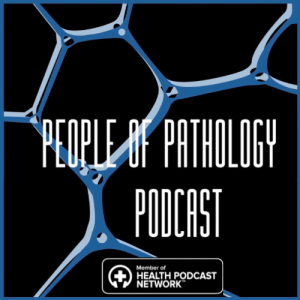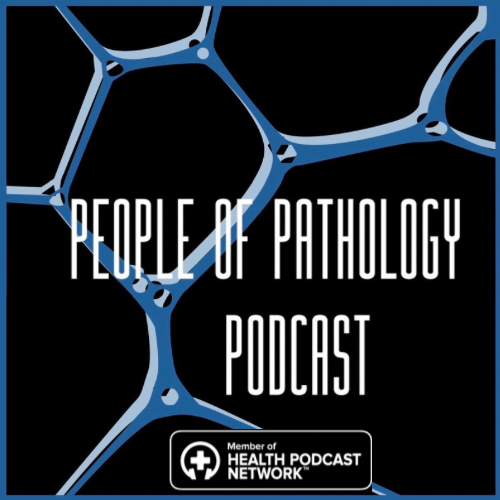Episodes

Monday Apr 21, 2025
Monday Apr 21, 2025
My guest today is Dr Swikrity Baskota.
What we discuss with Dr Baskota:
- How Dr Baskota uses social media to promote pathology
- Attracting more students to pathology
- Founding and expanding Match to Path
- The importance of mentorship
- Challenges for pathology applicants and how Match To Path can help
- Free resources on Match to Path
- Dr Baskota's personal journey into pathology
- Advancements in cytopathology and AI
- Advice for aspiring pathologists
Links for this episode:
Pathologists' Assistant Shadowing Network
Match To Path:
Dr Swikrity Baskota:
People of Pathology Podcast:

Monday Apr 14, 2025
Monday Apr 14, 2025
Today is #PathAssistDay 2025, and my guest is Pathologists' Assistant Marissa Spencer.
What we discuss with Marissa:
- The evolution of PA education and training
- Personalized teaching approaches
- The rewarding role of a preceptor
- The growth and expansion of PA programs across the country
- PAs in Forensic Pathology
- The PA's role in teaching residents
- The Role of PAs in tissue banking
- Future Directions: technology in pathology
- Advocating for the PA profession
- Advice for aspiring PAs and the importance of shadowing
Links for this episode:
Pathologists' Assistant Shadowing Network
American Association of Pathologists' Assistants
People of Pathology Podcast:

Monday Mar 31, 2025
Monday Mar 31, 2025
My guest today is Ashley Kalinauskas, CEO of Torigen Pharmaceuticals.
What we discuss with Ashley:
- How her graduate research at Notre Dame led to the founding of Torigen Pharmaceuticals.
- Their approach provides an alternative to chemotherapy by using immunotherapy.
- The company aims to make cancer treatment more accessible and affordable for pet owners.
- Promising results have been seen in aggressive cancers like hemangiosarcoma.
- How Torigen is utilizing digital pathology with the Concentriq platform to improve cancer diagnostics.
- Torigen is conducting research into additional applications, including equine and exotic animal cancers.
- Studying spontaneous cancer in pets provides valuable insights for human oncology research.
- Veterinary immunotherapy advancements have the potential to influence human cancer treatments.
- Immunotherapy is playing an increasingly important role in both veterinary and human medicine.
Links for this episode:
Pathologists' Assistant Shadowing Network
People of Pathology Podcast:

Monday Mar 17, 2025
Monday Mar 17, 2025
Today my guest is Dr Meredith Herman.
What we discuss with Dr Herman:
- The recently published paper titled "#Path Art: From Glass Slide to Canvas with a Mission of Enlightening the Burdens of Life."
- The inspiration for the paper came from the use of the hashtag #PathArt on social media, where pathologists share artistic representations of histology and pathology.
- The research involved exploring the historical use of art in pathology, dating back to the 1600s, and its role in education before modern technology.
- Pathology is inherently visual, making art a natural fit for the field; many pathologists have creative hobbies.
- The rise of Path Twitter (now Path X) has positively influenced the pathology community, fostering a movement around pathology art.
- Path art competitions have emerged, promoting interest in pathology among students and the public.
- Ethical considerations in path art include maintaining patient anonymity and being sensitive to the serious nature of diseases depicted.
- The importance of intent in sharing art, aiming for education and appreciation rather than trivialization.
- White Coat Artistry, which Dr Herman started during medical school, and has grown through social media engagement.
- Dr Herman's journey into pathology beginning with an interest in biomedical laboratory science and was solidified by mentorship from a pathologist.
Links for this episode:
Pathologists' Assistant Shadowing Network
#PathArt: from glass slide to canvas; with a mission of enlightening the burdens of life
Dr Herman on Instagram
People of Pathology Podcast:

Monday Mar 10, 2025
Monday Mar 10, 2025
Today my guest is Jason Maloney, VP of Customer Experience at Proscia.
What we discuss with Jason:
-
His background in customer-facing roles across various company sizes.
-
Being drawn to Proscia by the opportunity to impact lives through digital pathology.
-
Customer Experience (CX) encompasses professional services, technical support, and customer success, focusing on the post-sale experience.
-
Many companies in the industry focus on product development without adequately addressing customer needs and experiences.
-
Jason applies insights from various industries, emphasizing the importance of treating customers as humans and understanding their workflows.
-
Proscia's CX strategies have led to reduced time to go live with software and improved overall customer satisfaction.
-
Proscia fosters a continuous feedback loop between customers and internal teams, enhancing product development and customer support.
-
Proscia's CX team helps pathologists and researchers integrate AI into their workflows, providing expertise and support.
-
The future focus will be on developing trusted advisor relationships with customers, enhancing customer success initiatives, and deepening problem-solving capabilities.
Links for this episode:
Pathologists' Assistant Shadowing Network on LinkedIn
Expanded Customer Experience (CX) Practice Enables Users To Realize Value Over 30% Faster
People of Pathology Podcast:

Monday Feb 24, 2025
Monday Feb 24, 2025
My guest today is Razik Yousfi, CEO of Paige.
What we discuss with Razik:
- Joined Paige in 2019 as Head of Engineering
- Transitioned to CEO to lead the organization in focusing on AI strengths
- Shift from a technical focus to overall company accountability.
- Increased responsibility in setting vision, strategy, and external representation.
- Importance of Data in AI
- AI models depend heavily on the quality of training data.
- Paige emphasizes diverse datasets to improve model performance.
- Access to a rich dataset from over 800 institutions in 45 countries.
- Foundation models enhance the ability to analyze rare cancers and biomarkers.
- Models trained on large datasets improve application development speed.
- Microsoft partnership including working with Microsoft Research and Azure.
- Potential for AI to improve patient care and outcomes through better data integration.
- Alba Introduction: Launched as a clinical-grade AI co-pilot for pathologists.
- Some foundation models, like Virchow, have been open-sourced for research.
- Open-sourcing aims to build trust, encourage benchmarking, and boost the ecosystem.
- Encourages collaboration and faster application development in pathology
Links for this episode:
People of Pathology Podcast:

Monday Feb 10, 2025
Episode 197: Angie Dowell - Exploring Standardizing Grossing Data With AI
Monday Feb 10, 2025
Monday Feb 10, 2025
Today my guest is Angie Dowell from Vistapath.
What we discuss with Angie:
- Her start in microbiology as a tech in a hospital.
- Transition to Pathologists’ Assistant
- Her belief AI can improve efficiency by handling repetitive tasks, allowing focus on higher-level thinking.
- Standardization in Grossing
- Advantages of Standardized Templates
- Her role at Vistapath as a Customer Success Manager
- Impact of AI on Pathology
- Future of Pathology with AI
Links for this episode:
People of Pathology Podcast:

Monday Jan 13, 2025
Episode 196: Bami Farinre - The Mentor's Journey: From Learning To Leading
Monday Jan 13, 2025
Monday Jan 13, 2025
Bami Farinre returns to the podcast for an in depth discussion of her new book The Mentor's Journey - From Learning to Leading.
-
The book has been a long time coming, inspired by the Bami's early career experiences in STEM as a biomedical scientist and the need for mentorship.
-
She guest grew up in a community where mentorship was intrinsic and not formally defined, with a strong emphasis on education and support from the community.
-
Bami believes mentorship is crucial for developing future leaders and emphasizes the importance of passing on knowledge.
-
The book is part instructional and part autobiographical, using personal experiences to make it relatable.
-
Emotional Intelligence is essential for managing expectations and emotions in mentorship relationships, fostering trust and open dialogue.
-
Allyship is advocating for inclusion and standing in solidarity with someone, while sponsorship involves actively using influence to create opportunities for someone else.
-
Mentors gain fresh perspectives, sharpen leadership skills, and experience fulfillment from their mentees' successes.
-
Reverse Mentorship: Younger mentees can teach mentors about new technologies and perspectives, enriching the mentor's experience.
-
Bami emphasized the importance of passing on knowledge and creating a legacy through mentorship.
Links for this episode:
The Mentor's Journey - From Learning to Leading on Amazon
People of Pathology Podcast:

Monday Dec 30, 2024
Monday Dec 30, 2024
Anna Dhody is back for Part 2 of our conversation.
What we discuss in Part 2:
- How the pandemic prompted the Mutter Museum to increase its online presence, leading to a virtual tour that garnered over a million views.
- A significant event during this time was the donation of a human heart from a living donor, Rob, who wanted to contribute to the museum after receiving a heart transplant.
-
Anna filmed an unboxing video of the heart, which unexpectedly went viral, attracting a wide audience and generating interest in the museum.
-
The success of the heart unboxing led to a series of educational videos about the preservation and display of biological specimens.
-
Anna's videos fostered a community where viewers shared personal stories and experiences related to medical conditions, leading to increased awareness and support.
-
After leaving the museum, Anna founded the Dhody Research Institute to continue her work in science communication and education.
-
The institute aims to increase accessibility to medical and scientific information and inspire young people to explore STEM careers.
-
Anna is developing new video series, including "What's That For?" which invites viewers to guess the purpose of medical objects and learn their stories.
-
The Dhody Research Institute is running a fundraising campaign to support the production of more educational content.
-
Anna emphasized the importance of educating young people to become informed citizens and critical thinkers in today's world.
Links for this episode:
Former Mütter Museum forensic anthropologist launches research institute
Dhody Research Institute on Instagram
Dhody Research Institute on YouTube
Former Curator Anna Dhody has launched the Dhody Research Institute! (and you can help)
People of Pathology Podcast:

Monday Dec 23, 2024
Episode 194: Anna Dhody Part 1 - Bones, Museums, And Seizing Opportunities
Monday Dec 23, 2024
Monday Dec 23, 2024
My guest today is Forensic Anthropologist Anna Dhody.
What we talk about with Anna in part 1:
- Anna initially studied archaeology, influenced by visits to the Penn Museum in Philadelphia as a child.
- She developed a passion for archaeology at a young age, around 9 or 10 years old.
- Chose Boston University for its separate archaeology department, which offered more opportunities than those combined with anthropology departments.
- After attending an excavation in Belize during her sophomore year, she became interested in biological anthropology, focusing on human bones and their stories.
- She realized the competitive nature of academia and planned to pursue a master's in forensic science instead of a PhD.
- Anna wrote a thesis manual titled "The Underground Crime Scene" for law enforcement on how to excavate buried crime scenes, which gained unexpected international circulation.
- Applied for jobs after graduation and was scouted by the CIA but ultimately accepted a position at Harvard's Peabody Museum due to the need for osteologists for a NAGPRA project.
- Worked at the Peabody Museum for four years, taking advantage of free classes and gaining valuable experience.
- Became involved with a United Nations project in Peru to train local medical personnel in forensic anthropology, which turned into a significant teaching role.
- Returned from Peru and took a temporary position at the Mütter Museum in Philadelphia. What was initially meant to last five months ended up lasting nearly 20 years.
- Anna’s career path was shaped by a combination of luck and the challenges faced in the museum world, emphasizing the importance of seizing opportunities.
Links for this episode:
Former Mütter Museum forensic anthropologist launches research institute
Dhody Research Institute on Instagram
Former Curator Anna Dhody has launched the Dhody Research Institute (and you can help)
People of Pathology Podcast:

